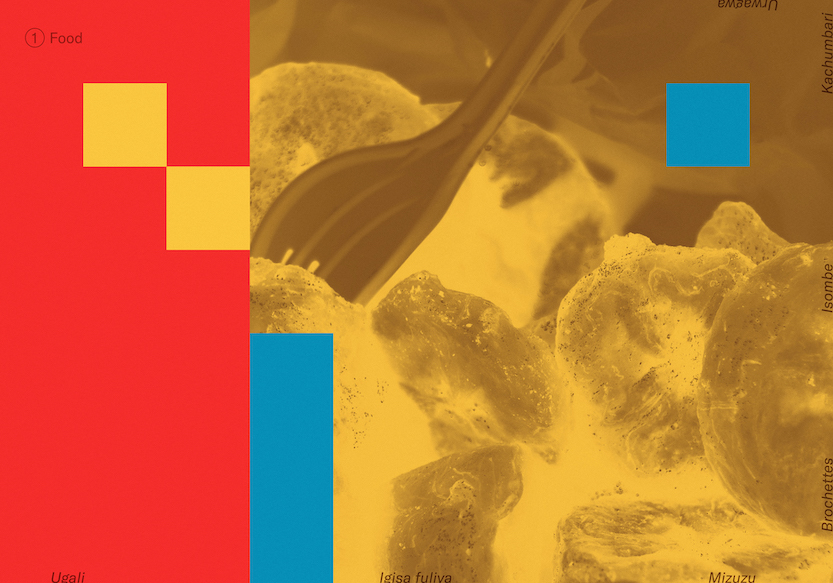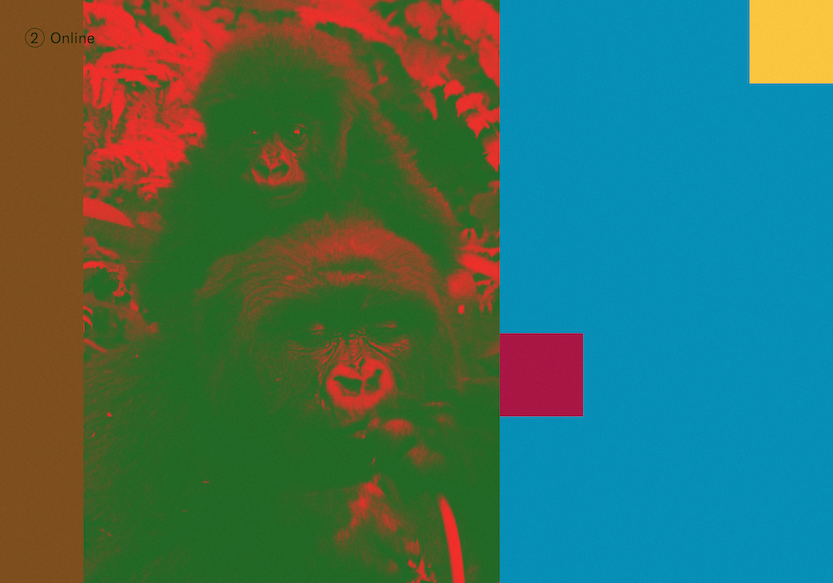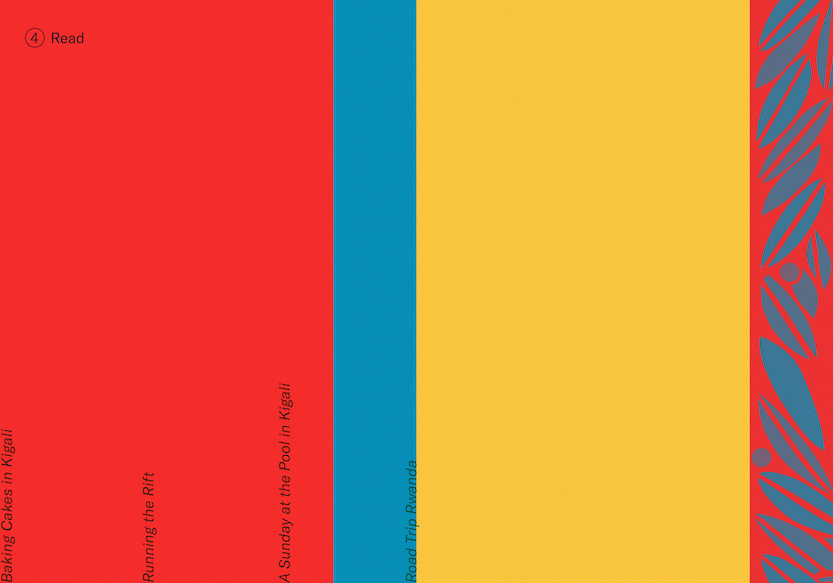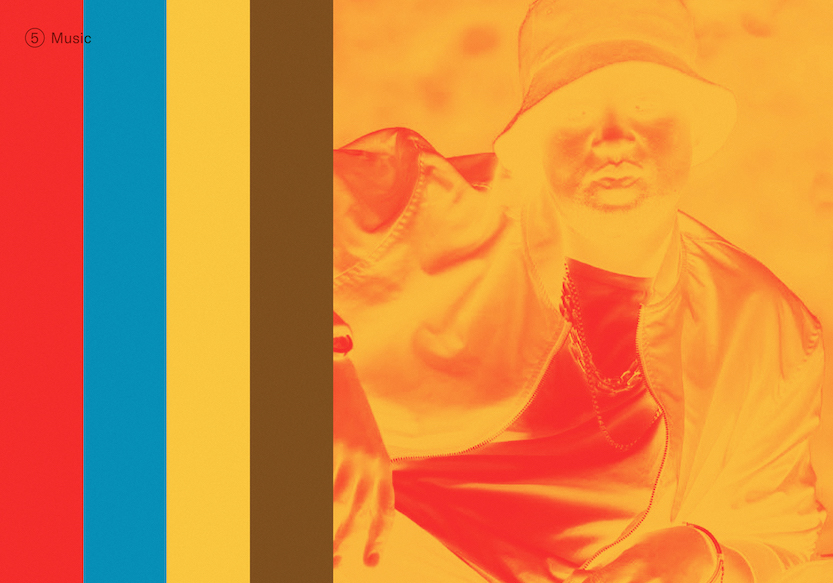Get to know Kigali, Rwanda, from home with these recipes, online experiences, books, movies, artists, and lessons in language and etiquette.
“One can only characterize Kigali as a city of hope. Every traveler seeking Africa’s true success story should visit this place,” says artist Colin Sekajugo of his city, the capital of Rwanda. The 1994 genocide against the Tutsis had a lasting impact on the entire country, claiming approximately 800,000 lives over the course of 100 days.
But in the time since, a series of forward-facing initiatives have encouraged the country’s progress while dedicated sites like the Kigali Genocide Memorial aim to acknowledge, respectfully observe, and attempt to atone for the past—a past that the country’s artists and entrepreneurs, forever changed but no longer divided, unite to discuss through their work.
In a mission to set a new standard for the world and recreate itself in a new image, Rwanda has excelled in a number of fields in recent years. The country prohibits the use of plastic bags or wrapping entirely and established Umuganda, a monthly national clean up day—two moves that helped make it one of the cleanest and greenest places in the world.
Additionally, the Kigali Green City project ventures to build sustainable and affordable neighborhoods for residents, putting billions towards environmental protection. Kigali was also the birthplace of the first smartphones made on the continent, as well as a major proponent of the switch to electric cars.
With its vast environmental efforts and uplifting arts community at the forefront, check out our guide to exploring Kigali from home—including the best books, movies, and tunes that address the mistakes of the past while looking forward to its promising future.
Rwandan Recipes to Try
Ugali (or ubugali)
Although the name changes depending on where you are, this thick maize flour porridge is a staple not just in Rwanda, but across the African continent. Ugali is simple to make and complements a variety of different meat and vegetable dishes.
Igisa fuliya
This mouthwatering chicken, vegetable, and plantain stew comes together quickly with ingredients you likely already have at home: a few chicken cutlets, onions, leeks, tomatoes, bell peppers, spinach, and celery. Follow this recipe and throw in a hot pepper for a little extra kick.
Mizuzu
Also known as fried plantains. Crisp on the outside and soft on the inside, you can eat these on their own, incorporate them into a number of Rwandan dishes like agatogo (a hearty veggie stew) with collard greens, or serve them alongside brochettes (keep reading).
Brochettes
Often made with goat, beef, chicken, or pork, marinated in tomato puree, and grilled alongside diced onion, chili, and other veggies these tasty grilled meat skewers are easy to make at home.
Isombe
Isombe is a thick paste made primarily of cassava leaves, eggplant, and a dash of peanut butter. Try this recipe for yourself at home and serve alongside a helping of rice, beans, or bread.
Kachumbari
Essentially a light summer salad, kachumbari comes together with just a couple fresh ingredients like tomatoes and onions drizzled with lime juice and olive oil. Simple, but refreshing!
Urwagwa
You’ve tried every craft brew from here to Asheville to San Diego—but have you ever tried uragawa (banana beer)? Popular in breweries and bars throughout the city, one pint of Mongozo will elevate your very definition of beer.
7 Pantry Staples for Travel Lovers→
Experience Rwanda Online
Learn About Rwanda’s Environmental Successes
With Kigali leading the way, Rwanda has been lauded as one of the greenest countries in Africa—but these efforts extend far beyond the borders of the capital. In places like Volcanoes National Park in northwest Rwanda, local organizations work hard to protect endangered flora and fauna, especially the gorilla population. You can see an example of this work through Gorilla Game Changers, a short series that goes in-depth on local conservation efforts.
Pick Up a Virtual Newspaper
The New Times is the most popular English-language publication in Kigali. If Rwandan lifestyle, news, and culture are relatively new topics to you, this is a great way to get up to date on all the happenings in the capital city and throughout the country, ranging from political updates and opinions to sports and entertainment.
An Abundance of Languages
Rwanda has three official languages—English, French, and Kinyarwanda—so you have plenty of options to choose from in terms of language education. For the latter two, check out Learn French with Vincent and French101Pod on Youtube, both of which have great French lessons for beginners and experienced learners. For a crash course in Kinyarwanda, Theo is Back on Youtube will get you started on the basics (with important notes on culture) in minutes.
12 Travel-Inspired Classes to Take Online→
Movies Inspired by Kigali
Hotel Rwanda (2004)
The most critically-acclaimed film about the 1994 genocide, Hotel Rwanda is based on the true story of Paul Rusesabagina, a hotelier who sheltered and hid refugees at the Hôtel des Mille Collines in Kigali. The watch is brutal, but there are few other pieces of media that better show the gravity of the situation—and what global reactions to it say about our world. Rent it on Youtube or Prime, or watch for free on Hulu.
Sometimes in April (2005)
Another historical drama centered around the genocide, Sometimes in April stars Idris Elba as Augustin, a Hutu captain of the Rwandan Armed Forces who becomes separated from his family—including his three children and his wife, a Tutsi—during the 1994 fallout. A decade after the violence, he returns to Rwanda to seek the closure he needs to heal. Rent it on Youtube or Prime, or watch for free on HBO.
Finding Hillywood (2013)
This 2013 documentary follows the burgeoning Rwandan film industry—named Hillywood after Rwanda’s nickname, “Land of a Thousand Hills”—and the filmmakers working to establish Kigali as a new capital for cinema, to make cinema more accessible to their communities, and to use art as meditation. Watch on Vudu for free, or rent from Youtube or Prime.
Africa United (2001)
In this story of friendship and faith, a group of young friends from Rwanda embarks on a 3,000-mile journey across seven different countries to Johannesburg, South Africa, to achieve their dream of attending the 2010 World Cup in Johannesburg—and, of course, run into a few obstacles along the way. You can catch it on iTunes.
Sweet Dreams (2013)
This documentary tells the story of Ingoma Nshya, a Rwandan all-women drumming group formed in the wake of the genocide with both Hutu and Tutsi members. Through their music and their later business ventures, the women create a community in the musical arts that serves to unite them and help them heal from a dark past. You can watch it on Vudu or Prime.
6 International Films to Transport You Elsewhere→
Books Inspired by Kigali
Baking Cakes in Kigali by Gaile Parkin
When Angel, a Tanzanian baker, moves to Rwanda with her husband and five orphaned grandchildren, her shop in the heart of Kigali becomes a staple of the community. As she welcomes locals into the shop to share the stories of their lives over decadent desserts, she learns more about her newfound home—as well as her own family.
Running the Rift by Naomi Benaron
In this novel and winner of the Bellwether Prize for Socially Engaged Fiction, runner Jean Patrick Nkuba dreams of winning the first Olympic gold medal for track for Rwanda. But as violence against the Tutsis in Rwanda escalates, the road to the highest honor in athletic achievement may also lead to his safety.
A Sunday at the Pool in Kigali by Gil Courtemanche
A story of love in a time of chaos, this novel takes place at the Hôtel des Mille Collines, the same hotel where the events of Hotel Rwanda unfolded. It’s here that Bernard, a foreign journalist, meets waitress Gentille, and the two begin an intense romance. When the genocide begins to take over Rwanda—eventually reaching the hotel—their blossoming relationship is put to the ultimate test.
Road Trip Rwanda by Will Ferguson
In this semi-autobiographical work, award-winning author Will Ferguson and his friend, Jean-Claude Munyezamu, return to Munyezamu’s native Rwanda twenty years after he narrowly avoided the start of the genocide against the Tutsis. During their road trip together, they recount the horrors of the event while also discovering the hopeful atmosphere of a country on the mend.
9 New Book Releases to Read in Quarantine→
Music Inspired by Kigali
The Ben
One of the country’s most popular artists, Benjamin Mugisha—known in the industry as The Ben—was born in Uganda but launched his career in Kigali, eventually becoming one of the country’s most popular R&B artists. His career exploded in 2008 when he was awarded “Best Afro R&B Singer of the Year” at the Salax Music Awards (which he would go on to win again the following year). He’s since moved to the United States and has performed for major audiences, including at the 2010 World Cup in Johannesburg and the United Nations headquarters.
Mani Martin
Mani Martin is a man of many talents—acting, social activism, and a public relations specialist among them—but surely a stand out is his musical range. Well-versed in the arts of gospel, pop, and R&B, Martin marries Afro-soul and traditional Rwandan music for tracks that bring his heritage to a modern stage.
Butera Knowless
Often shortened simply to Knowless, this Rwandan singer-songwriter’s bright, high-energy tracks and love song-filled discography. Even better than Knowless’s music are her music videos, which often highlight the striking beauty of East Africa.
Kitoko
Born Patrick Bibarwa, afrobeats and hip hop artist Kitoko got his start in 2010 when his debut album Ifaranga launched to widespread success in both Rwanda and neighboring Uganda when the artist was just 25 years old. Turn on his latest album, 2019’s Kitoko Bibarwa, for a good, sweaty dance session right at home.
The Good Ones
Recording from a hilltop farm, the members of The Good Ones came together as survivors of the genocide to create beautiful and upbeat folk tracks. Their most recent album, You Should Be Loved, is an especially good place to start for a taste of the themes of love and hope present throughout their music.
19 International Artists to Upgrade Your Music Taste→
Kigali’s Art Scene
Colin Sekajugo
Rwandan-Ugandan multidisciplinary artist Collin Sekajugo is known both for his expressive mixed media works as well as for founding arts incubator and gallery Ivuka Arts Kigali. He’s also been our personal guide to Kigali, calling out his favorite places to see art, eat, and enjoy the view.
Ivuka Arts
In 2007, Ivuka Arts helped pioneer Rwanda’s blossoming visual arts scene by encouraging burgeoning young artists to exhibit work and bond over creative pursuits as Kigali’s first visual arts incubator. Founded by Sekajugo, many artists (including the founders of the Inema Arts Center, mentioned below) found their bearings here—making Ivuka a soon-to-be historic spot as the birthplace of Rwanda’s new explosive art movement.
Moses Izabiriza
The colorful patterns native to Moses Izabiriza’s art makes it almost instantly recognizable, whether displayed on a canvas or on a large scale in the form of a mural. Like many local artists in Kigali, Izabiriza got his start at Ivuka Arts and has gone on to exhibit work everywhere from Imago Mundi, a collection started by Italian businessman Luciano Benetton that focuses on uniting art from around the world, to the U.S. Embassy in Kigali.
Innocent Nkurunziza and Emmanuel Nkuranga
These two brothers, multidisciplinary artists, and co-founders of the Inema Arts Center in Kigali are both key figures in the growing Rwandan art scene themselves. Nkurunziza’s work, with its intricate and meticulously-painted swirls of color, draws inspiration from Rwanda’s natural environment. Nkuranga’s impressionist painting style and eco-friendly sculptures have earned him international recognition as one of Africa’s best emerging artists.
Inema Arts Center
Established in 2012 by Innocent Nkurunziza and Emmanuel Nkuranga, this gallery space and artist residence came into being with similar sentiments of Ivuka Arts: to bring a community in which creatives can gather and enjoy a shared interest in the arts to Kigali. Along with an art gallery exhibiting art from both Rwanda and across Africa, Inema also offers a workshop and training for local craftswomen, as well as an outdoor space for dance lessons.
15 Emerging Art Galleries Around the World→
Speaking Kinyarwanda in Kigali
For a more in-depth education, educators Betty Ellen Cox and Gakuba Faustin offer an enormous (and printable!) language sheet with over 125 Kinyarwanda lessons for any curious soul who’s really ready to immerse themselves in the language. But for starters, the greetings below should help you out just fine.
Greetings
Kinyarwanda employs specific greetings for various times of day and situations. For starters, use muraho for a basic hello. Mwaramutse can be used to say “good morning,” while you should say mwiriwe for “good afternoon” or “good evening.” At the end of the evening, say muramuke to say “good night.” Finally, for a final goodbye, use murabeho. (A lot of options, but you’ll get the hang of it!)
Whether someone speaks Kinyarwanda or French, you can always try Uvuga icyongereza? to ask “Do you speak English?” if you get stuck!
Murakoze
Murakoze to say thank you, or murakoze cyane for “thank you very much.”
Nyamuneka
Say nyamuneka for “please.”
Yes/No
Yego or yee for “yes,” and oya for “no.”
Imbabazi vs. umbabarire
Use imbabazi to say “sorry,” while umbabarire is used to say “excuse me.”
Kigali Etiquette
Modesty is the best policy
Compared to places like New York or LA, Kigali generally leans toward a more conservative way of dress. Women in particular tend to dress reasonably modestly, covering shoulders and legs when out and about.
Be considerate
Much of the work coming out of Rwanda surrounds the genocide because it is still a relatively recent event. Although artists, entrepreneurs, and others may express themselves openly in their work, keep in mind that most people are still healing from the loss of loved ones and be sensitive when addressing the topic.







